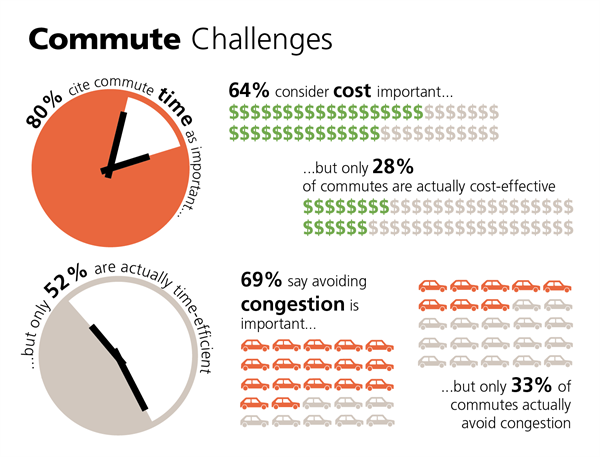
John Walker
MPC's Commute Options pilot helps employers connect employees with practical alternatives to driving to work every day.
Get In the Loop on all the latest transportation headlines.
Did you know? Workers can set aside $125 each month pre-tax to pay for mass transit expenses.
Do you wish there was a one-stop shop to help you save time, money and the stresses often associated with getting to and from work? The Metropolitan Planning Council’s Commute Options pilot is proving Chicago is in need of a place to educate commuters on their transportation options.
Now in its second year, the Commute Options pilot works with 15 Chicago and suburban employers, surveying employees to find out how they get to work and what barriers prevent them from their preferred commute. Workers have reported they are stuck driving alone because their home or workplace is too far from a train or bus stop, they don't have carpool connections, or they can't take transit because they need to pick the kids up after work. After analyzing the survey responses, MPC works with each company—and 12 partner organizations that provide transportation options in the region—to identify the best fit for their employees' commutes, based on their location, employees' opinions, and company goals. Options include bicycling, carpool matching, signing up for the federal transit pre-tax commuter benefit program, and even water taxis. The intent is to encourage employees to stop driving alone and try a different commute that can save money, time and fuel.

The pilot has underscored that Chicago and suburban employees face different commute challenges. Nearly 88 percent of suburban employees drive to work five days a week, while only 60 percent of people who work in Chicago drive. This could be because suburban businesses are more likely to offer free, on-site parking, whereas city employers are more likely to enroll in the federal transit commuter tax benefit program. Also, suburban employees are more likely to travel greater distances to work, on average more than 20 miles one way, while city employees typically commute 11 to 20 miles in each direction.
While suburban and urban workers both care about their commute times and avoiding congestion, suburban workers express greater concerns about safety and Chicago workers care more about cost. When asked how they would prefer to commute, suburban workers were most interested in working from home and city workers said they would prefer to take transit.
Hidden barriers also exist that, if addressed, could change commuting for many people. For instance, the Shedd Aquarium—a Chicago employer participating in Commute Options—is located on Museum Campus, which presents several issues for employees who want to use public transit. Chicago Transit Authority’s (CTA) 146 bus is the only direct, year-round transit access serving Museum Campus. However, the bus route traverses congested Lake Shore Drive and Michigan Avenue on its way through the Loop, and is often delayed by the time it reaches the Shedd. For employees who commute via Metra from the suburbs, there are no direct bus connections to Ogilvie or Union Stations. While the Shedd has many employees who bike to work, and provides extensive bike facilities, employee parking is only $40 per month, less than half the price of a CTA 30-Day Pass. Many employees choose to drive alone to work each day due to the lack of reliable transit options. However, when MPC analyzed Shedd’s Sustainabilty data regarding commuting, many Shedd employees who responded said they would love to see improved transit access. One solution would be to survey all employers located on Museum Campus to understand if a critical mass of employees merits improving transit service. This solution also would meet the goals of Chicago’s Central Area Plan, which calls for making transit the first choice for people coming in to the Central Area.
For more information about the Commute Options pilot and to read case studies highlighting what Chicago-area employers are doing to promote transportation options to their employees, visit MPC’s Commute Options web page.
MPC Research Assistant Melanie Truhn contributed to this article.
Get In the Loop on all the latest transportation headlines.